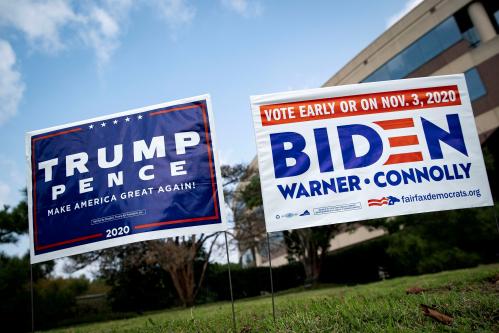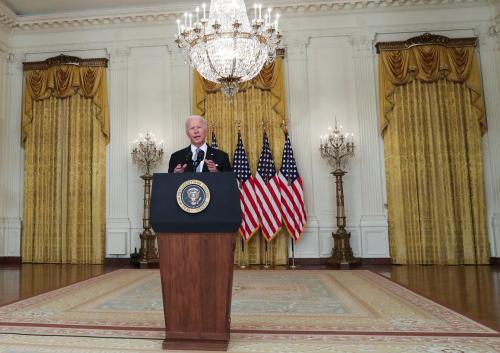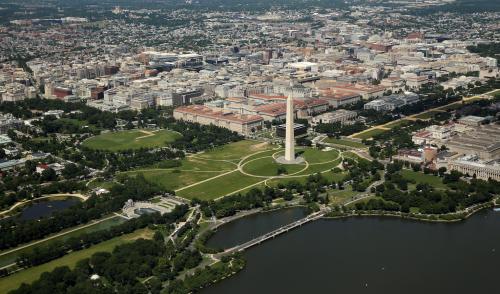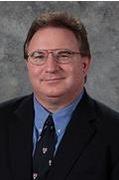On February 16, 2018, I got a typically touching email from an old friend, personal hero, and gentle giant: Paul A. Volcker. Referencing the draft of a book chapter on his public service reform legacy that I’d sent to him just days earlier (whether saving the world economy or doing more personal chores, his turnaround time was epic), he wrote: “Your remarks…are eloquent, to the point, and much appreciated. Let us have hope—and can’t we find some way for lunch or something? I miss you.”
I first got to know Paul, who died on December 8th at age 92, some three decades ago when he, the former Federal Reserve Chairman credited with taming global inflation, took on a much harder task: reclaiming American public administration and reforming the U.S. civil service.
In 1990, the first report of the National Commission on Public Service (aka, the Volcker Commission) was published. Paul’s passion for making government work better, cost less, and inspire public trust stretched back decades. It had less to do with lessons that he learned at the Fed and more to do with lessons that he learned from his father.
In the 1930’s, Paul Sr. was a city manager in Teaneck, New Jersey (about twenty minutes outside of New York City) who became a local legend by professionalizing the township’s public agencies while rescuing it from bankruptcy. Paul Jr. would want me to note that the family public service saga actually began in the 1920’s when Paul Sr. became a city manager in Cape May, New Jersey, the staid seaside resort town known, then as now, for its spectacular old Victorian hotels—and for its century-old rivalry with the blue-collar, honky-tonk 7-mile island on its northern doorstep, the Wildwoods, which was, and remains, much-favored over Cape May by me and my Philly friends. (“Gee, Cape May and Wildwood; that explains a lot about you—and me, too!” he once half-joked.)
In the early 1990’s, shortly after Paul joined the faculty of Princeton University’s Woodrow Wilson School, he adopted me, then the faculty director of the school’s domestic Master of Public Administration program, as his in-house “public administration guy.” Back then, and on and off for many years thereafter, he and I spent more time together than was probably good for either one of us lamenting the state of U.S. public administration, not only as a field of practice, but even more so as a field of study.
As Paul recounted in Keeping at It: The Quest for Sound Money and Good Government (the autobiography published in 2018 that he penned with superb support from Christine Harper), apart from stellar academic leaders in public administration like Paul C. Light and Donald F. Kettl, we found little reason for optimism regarding the university sector’s commitments to meaningful public service training or public administration research and teaching. Paul thought that the problem with “public policy schools,” not only Princeton’s but more generally, had much to do with what he considered to be intellectual chauvinism within the academic economics profession. In Keeping at It, for instance, he recalled:
The point was driven home to me one evening when, by chance, I was walking with a young economics professor toward the Woodrow Wilson School. I idly remarked that “this university doesn’t pay enough attention to public administration.” “Why should it?’ he responded. “Public administration is not a real discipline like economics.” Politely, I restrained myself from reminding him of the abject failure of economists to make reliable forecasts…or to foresee and understand the financial crisis that we were then undergoing…
While “keeping at it” within the university, in 1993, Paul encouraged me to launch what became the Brookings Institution’s Center for Public Management, an institutional ancestor of today’s Brookings Center for Effective Public Management. He helped to make it happen, and he assisted with much of the work we did during the unit’s most prolific period. For example, in 1994, we published an edited volume, De-regulating the Public Service: Can Government Be Improved? , to which Paul eagerly contributed a foreword that he co-authored with former Mississippi Governor William Winter (then head of a commission that was doing for state and local government what the Volcker Commission had done for the federal civil service). It concluded with these memorable words:
Of one thing we are positive: effective public service is essential to our democracy. Yet, the people are not getting the quality of service to which they are entitled and upon which confidence in government rests. The need for reform cannot be overstated.
Paul’s own public service ethos would have us neither whistle past nor whine about the many profound, seemingly implacable, present-day obstacles to public service reform. Lord knows that we need ever more of the high-minded but clear-eyed brand of leadership that he demonstrated at both ends of Pennsylvania Avenue, and on the world stage, during his 1979-1987 tenure at the Fed’s helm and many times thereafter including during the global financial crisis of the 2000s.
As Donald F. Kettl observed in his 1986 book, Leadership at the Fed, Chairman Volcker never blinked or winked at hard empirical truths, deftly navigated around rough political realities, and did so whether people applauded him or instead chose to “praise him with faint damns.” During his service as chairperson of President Barack Obama’s President’s Economic Recovery Advisory Board, Paul tutored Congress and the nation on how the financial system had been bollixed by a rapid expansion in the use of money-making instruments that were Greek to average citizens (most notably, perhaps, the rapid expansion in the use of so-called derivatives).
Reflecting Paul’s uncommon common sense, the Volcker Rule was intended to keep financial institutions from gambling wantonly either with their own money or other people’s money. Even before it took effect in mid-2015, it was the object of lawsuits by banks, critiques by Wall Street royalists and “free-market” think tank analysts, and constant congressional calls for repeal.
Through it all, Paul stood tall—and remained hopeful. In his foreword to Paul Light’s brilliant 2019 book, The Government-Industrial Complex, Paul wrote:
Light’s analysis emphasizes the importance of how people working under the aegis of the federal government are selected, compensated, and managed… The evident decline in trust in government…is silently but pervasively weakening the foundation of our society…Light sets out the substance of what is required for real and lasting reform…His book should be required reading for every member of Congress and president seriously interested in effective government…It’s time to pay attention.
It is indeed time to pay attention to public administration, both as a field of study and as a field of practice. Nothing would honor the civic and leadership legacy of America’s Mr. Public Administration more than launching a new Paul A. Volcker Commission to pick up where the big-hearted boy from Cape May left off.
The Brookings Institution is committed to quality, independence, and impact.
We are supported by a diverse array of funders. In line with our values and policies, each Brookings publication represents the sole views of its author(s).








Commentary
Paul A. Volcker: Champion of public administration
December 10, 2019